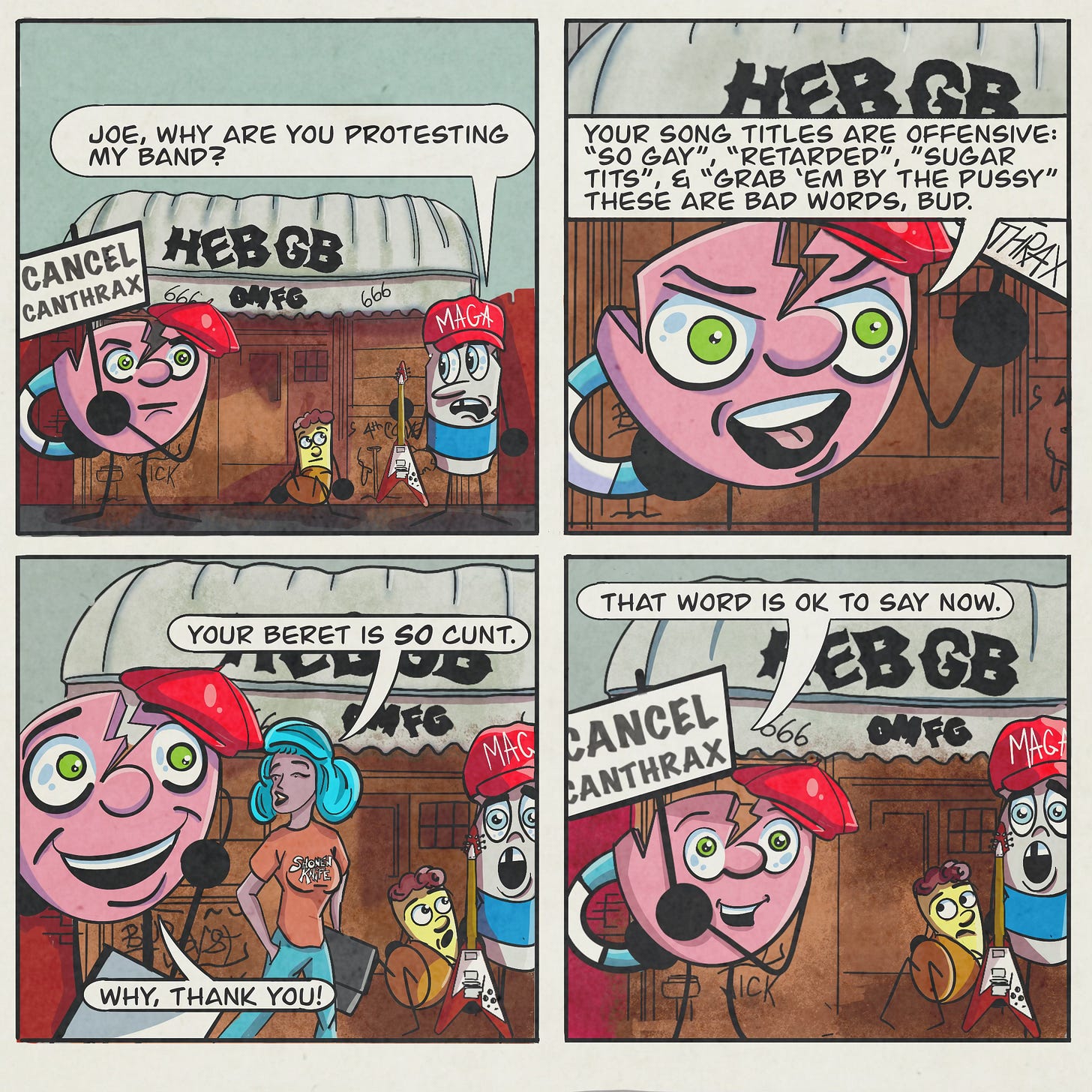**If some words offend you, you might want to reconsider reading this post**
In the next episode of Bud, Nick, & Joe, our beloved Trash Trio is loitering outside their usual haunt, HEBGB’s (pronounced heebie-jeebies, naturally). Bud, the ever-loyal right-wing beer can, is on his way to perform with his band, CANTHRAX—yes, that’s their actual name, and yes, it sounds exactly like the kind of noise Bud would make if he stubbed his toe.
Outside the bar, Joe—our radical left-wing Trans Mug—is holding a handmade protest sign and passionately objecting to Bud’s lyrics. CANTHRAX drops enough offensive language to make a sailor blush and a cancel committee salivate.
Then, just as Bud’s about to fire back, a young woman strolls past, spots Joe’s beret, and says, “That beret is cunt.”
Cue record scratch.
Bud flatlines.
Nick starts Googling.
And, totally unfazed, Joe says, “It’s okay to say that word now.”
This strip wasn’t pulled from the surreal corners of my imagination—it was inspired by real life.
At my day job, I’m surrounded by Millennials and Gen Z, which means I’m also surrounded by mysterious slang and the kind of cultural shifts that make you feel like you just woke up in a different dimension.
One rainy day, I decided to wear my $6 London Fog trench coat (a thrift store treasure, thank you very much). Everyone seemed into it—nods of approval, nice comments. But then, as I was heading out, a younger coworker said:
“Your coat is cunt.”
I blinked. Asked her to repeat it. Four times.
Each time, same word.
Finally, someone jumped in to clarify: “Yeah, you’re hearing it right. It’s a compliment now.”
At some point in time, the C-word was rebranded. What once carried the sting of shame is now fashion-forward, femme-fatale praise.
And it got me thinking—what is a “bad word,” really?
Language evolves. Words change meaning depending on generation, culture, race, intent, and context. Certain communities reclaim some words. Others are off-limits to outsiders. And some are still landmines, even when said with the purest intentions.
We live in a time where saying the wrong thing—on the wrong platform, to the wrong crowd, at the wrong time—can cancel you faster than a Netflix series with promise.
But here’s the thing: I’m a firm believer in free speech. Yes, even the ugly parts of it. Hate speech, as disgusting as it is, is still legally protected speech—but that doesn’t mean it’s useful. It usually just outs the speaker as a certified jerk.
For me, the question is always intent. Words on their own are just sounds and letters. It’s how we use them—and why—that gives them power. Demonizing language too broadly can lead us into dangerous territory, where fear replaces nuance, and everyone walks on eggshells instead of talking things out.
I never want to live in a world where a single spoken word could land me in prison—or worse. But I also don’t want to live in a world where we use language as weapons just because we can.
So what do you think?
Are words just words?
Or are they sacred?
Are we evolving or just arguing in new fonts?
One thing I know for sure: language is messy, humans are messier, and humor might be the only thing keeping us from tearing each other apart.
Take it easy,
James


